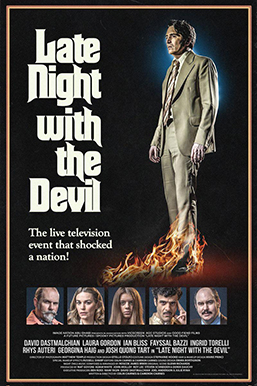Eye For Film >> Movies >> Late Night With The Devil (2023) Film Review

Few things compare to the pressures of live television. Holding a show together in front of an audience of millions and keeping them happy no matter what happens. Add to that the pressure of competing against a rival show, desperately trying to revive a flagging audience in order to get the show renewed, and the very personal nature of criticism for a host who has become a brand. With the recent death of his wife to deal with on top of all this, Jack Delroy (David Dastmalchian) is already sitting on a powder keg, before things begin to go wrong.
One of the most talked-about films of the year, Late Night With The Devil, which screened as part of Fantasia 2023, takes the 1970s talk show experience and turns it into something which you won’t be able to look away from. That things will go wrong is clear from the outset: the introductory narration presents the rest of the film as an artefact of television history, an opportunity to see that famous episode about which people continue to speculate to this day. Is what happened supernatural? That’s rather less clear. The film plays with perspective and leaves us with difficult questions. Evil may be more banal than its theatrical moments suggest, damnation rather more horrifically prosaic.

This episode of the show is a Halloween special, with all the cheesily spooky trappings you’d expect. There’s supposed psychic Christou (Fayssal Bazzi), professional sceptic Carmichael (Ian Bliss), and – for the climactic interview – psychiatrist June (Laura Gordon) and her teenage patient Lilly (Ingrid Torelli), who have co-written a book which claims that Ingrid is possessed by a demon. Jack lets his audience – behind the camera and in the studio – believe that he’s taking them all at face value, but allows them to challenge each other. How neutral is he, really? Little bits of information divulged in the introduction are enough to make the film’s audience wary. A dramatic incident with the studio electrics early on may be a staged stunt, but we don’t really know, and directors Cameron and Colin Cairnes keep us guessing.
It’s Dastmalchian’s light touch which really makes it work. Where a lesser actor would have dialled up the charisma – and the ham – he creates a small screen persona with an easy-going blandness, the sort of person whom ordinary Americans would feel comfortable with in their living rooms. A host needs to be charming but he should know how to step back and let his guests enjoy the limelight. Even offstage, Jack treats most people in a friendly manner, and has that ability, commonplace amongst successful team leaders, to remember everyone’s name and enough little details about them to make them feel special.
Other aspects of Jack’s personality take their time to become apparent. The considerable intelligence needed to stay on top of everything that’s happening on the show is something which he conceals behind a cultivated shy smile. When confronted with a real shock, he can recover his poise within seconds and maintain it for as long as the camera is rolling. In one of the film’s most chilling moments, we see him trying to persuade June to hypnotise Lilly on stage despite the psychiatrist’s fear that it could put her patient at risk. There’s none of the shouting and overt abuse here which we’ve seen in many similar moments in cinema, but his small changes in behaviour are incredibly exploitative and will leave you wondering just how far he is willing to go in manipulating people to get what he wants. One of the film’s best tricks is to leave you wondering if he knows what a monster he is.
Monster or not, he is also, very clearly, a troubled man, and we see enough of the raw human being underneath the act to feel for him as things begin to go awry. The film hinges on the psychological, on the way that his illusion of control begins to crack as it all becomes too much. The talk show structure divides it into parcels on intense interaction between the figures on the stage, with brief intermissions giving us a glimpse behind the scenes at what the crew is experiencing, at what the viewing figures are doing, those crucial numbers which hold Jack’s fate in the balance.
Everything here is perfectly put together. Those who remember the era will be sucked right back into it by the sets, costumes, make-up and hairstyling. An introductory montage of moments from Jack’s career shows him start out in a black suit which would look reasonably sharp today, then progress through a series of brown and beige ones which look increasingly unflattering yet reflect the fashions of the time, adding to the sense that his downfall is caused by forces he can’t hope to control. The film is also spot on in its understanding of the stagecraft involved in TV shows of this sort, and Dastmalchian’s stage experience shows in the ease with which he moves through the space.
All the petty cruelties of this dog-eat-dog world emerge as background detail. There’s good work from Rhys Auteri as the put-upon fall guy with whom Jack always pushes things a little too far. One might be reminded that The Exorcist also featured characters from the world of television, wrestling with these day to day conflicts as they variously neglected and fell prey to a possessed girl. As Lilly, Torelli has that same over-emphasised faux innocence, drawing on that American way of looking at girls as if they were more ornamental than human, which invites us to wonder how much of what comes later is possession, performance or mere frustration.
An exquisite study of human folly, both individual and collective, Late Night With The Devil makes its audience complicit but finds tragedy, and room for sympathy, in the fall.
Reviewed on: 11 Aug 2023

















